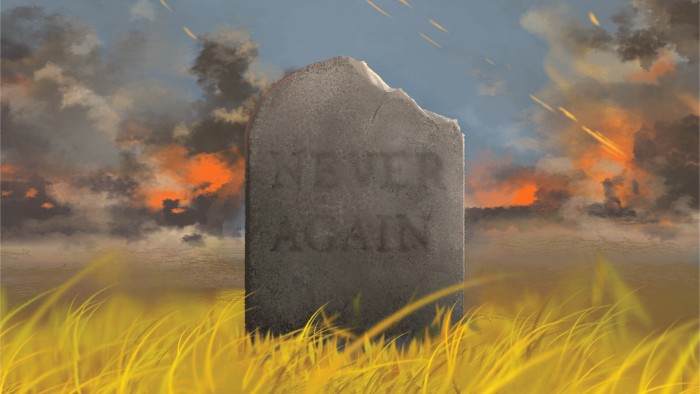Stay informed with free updates
Simply sign up to the Life & Arts myFT Digest — delivered directly to your inbox.
When I was growing up in the Dutch town of Leiden in the 1970s and 80s, everything looked placid yet it felt as if the second world war was still all around us. A colleague of my dad was the sole survivor of a wartime raid by his Resistance group. Our Jewish next-door neighbour had discovered only as a teenager that her father lost his first family in the gas chambers. My sixtysomething history teacher had come to Leiden as a young man, reportedly because he had to leave his hometown after having been fout (meaning “wrong”, a collaborator) under German occupation.
Eighty years after the Nazi surrender, what’s left of the war now? The political impacts are fading: the US no longer values Nato; the post-Auschwitz message, “Never again”, is barely heard, as ethnic massacres continue; and the post-Hitler taboo on the far right has lifted. The war’s deepest remaining effects are now personal traumas, handed down from the wartime generation to their descendants.
As a child, I realised only dimly that many of my contemporaries, born around 1970, were marked by the war. A friend on our street had a mother from Indonesia, who had spent five years of her childhood in a Japanese prison camp. Every morning in the camp, she and her older sister would collect their daily cup of rice. “Eat yours,” her sister would urge her, and the girl would finish it in two bites. Then the sister would taunt, “Now your rice is gone, but I still have mine.” When my friend was 17, his mother died young of liver cancer, possibly a belated consequence of childhood malnutrition. Those Japanese prison guards finally got her in 1987.
Another friend had a German dad, born during the war, who had been raised by an impoverished single mother after his own father died on the eastern front. The deprivation left this man obsessed with money. When my friend finished school, his father literally handed him a bill for his childhood, itemising the costs of food, clothing and shelter. Or there were the two impossible brothers, overinvested players in the first team, who terrorised our local cricket club. It was explained to me that their behaviour wasn’t their fault — their father had “been in a camp” and come home traumatised.
These people received little worthwhile psychological help. A psychiatrist in our town gave war survivors LSD, and got them playing with Nazi dolls, until he retired and his methods were discontinued. When I interviewed Dutch Holocaust survivors in 2000 for a book I was writing, I found that far from seeking therapy, many had never even spoken about their experiences to anybody.
Some traumas were passed on, even to the third generation. (Eighty years isn’t that long in a family.) Children of Holocaust survivors grew up trying to protect their parents from pain, instead of vice versa. Descendants of collaborators often lived with shame, or were shunned by people who knew the family secret.
Some survivors never expressed their guilt or traumas. One woman, Atie Visser, waited until she was 96 in 2011 before finally coming clean about the evening in 1946 that she had rung the doorbell at a house in Leiden. A Mrs Guljé had opened the door, and tried to turn on the light in the porch. But the light didn’t work. Visser’s accomplice (the grandfather of a boy I knew) had unscrewed the bulb. Visser said she had a letter for Mrs Guljé’s husband, the engineer Felix Guljé. When Guljé came to the door, Visser shot him.
The murder was intended as retribution. Visser’s Resistance group thought Guljé was a collaborator. After they had blown up a little local bridge in 1945, hoping to hamper the German last stand, he had rebuilt it. In fact, they had got it wrong: Guljé had done Resistance work, too. Visser was left trying to justify herself to his grandchildren.
Wars are heritable. An epidemiologist I know who visited Rwanda found an epidemic of untreated depression, a consequence of the 1994 genocide. Future generations of Palestinians, Ukrainians, Russians and Sudanese will inherit traumas. And Israeli killings of Palestinians are in part surely an expression of Israel’s collective war trauma: the perpetrators believe their violence can prevent another Holocaust of Jews.
But now the personal impacts of the second world war are fading as the public impacts did before. One day, all that will remain of the conflict will be the holes it left in the European landscape. Wherever you see a beautiful park in Europe, there’s generally an atrocity buried underneath. I remember when the atrocities were only half-buried.
Email Simon at [email protected]
Find out about our latest stories first — follow FT Weekend Magazine on X and FT Weekend on Instagram
